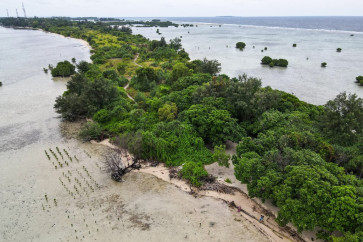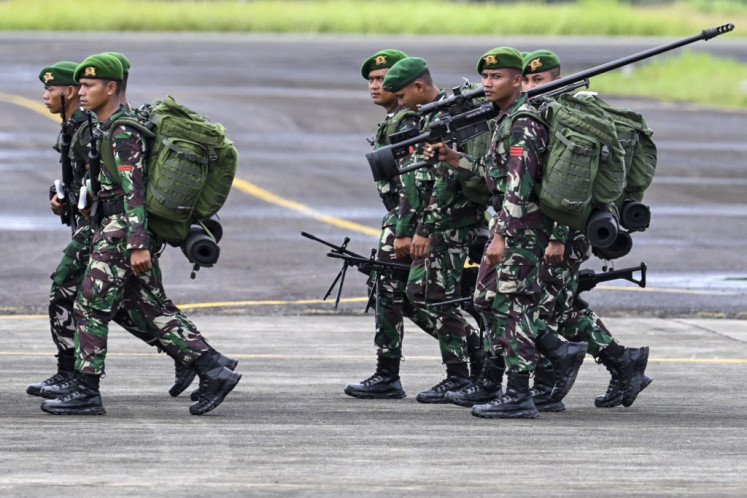Indonesia sets sights on artificial intelligence in new national strategy
The government has introduced a national strategy for developing artificial intelligence, but experts are calling for assurances that progress in this high-tech field is safe and beneficial for all.
Change Size
 A human hand and a robotic hand symbolize the connection between people and artificial intelligence technology. (Shutterstock/Willyam Bradberry)
A human hand and a robotic hand symbolize the connection between people and artificial intelligence technology. (Shutterstock/Willyam Bradberry)
The government has introduced a national strategy for developing artificial intelligence, but experts are calling for assurances that progress in this high-tech field is safe and beneficial for all.
Jakarta published a blueprint that will guide Indonesia in developing artificial intelligence (AI) between 2020 and 2045, at a time when governments and businesses around the world are increasingly turning to the field for solutions in law enforcement, financing and health care, among others.
Research and Technology Minister and National Research and Innovation Agency (BRIN) head Bambang Brodjonegoro said the country would focus its AI projects on education and research, health services, bureaucratic reform and food security as well as mobility and smart cities.
“We are all determined to create an independent, advanced and prosperous Indonesia. Let us successfully reform Indonesia from being a natural resource-based country to an innovation-based country,” Bambang said during the launch earlier this week.
The launch of the national guidelines, published as an e-book, marks a step forward in embracing AI technology and follows in the footsteps of many others who have already set up their own AI strategies, according to Organization for Economic Cooperation and Development (OECD) data.
The development of AI is one of five sectors in the ministry’s focus, apart from the development of the internet of things, advanced robotics, augmented reality and 3D printing.
In November last year, President Joko “Jokowi” Widodo said the government was looking to replace a number of civil service positions with AI to create a leaner bureaucracy.
Coordinating Economic Minister Airlangga Hartarto also said at the time that the government would employ the online single submission (OSS) system and the Single Map policy as part of its drive to use AI in government-related work.
Read also: 'Faster with AI': Indonesia to replace ministerial aides with machines
A number of state projects already employ AI technology, including one to anticipate forest fires, while some government agencies are promoting AI development and technology-based solutions at schools and teaching faculties.
However, the guidelines note that, while Indonesia’s demographic dividend and its “unique” datasets are among its strengths in developing AI, the country has neither the provisions to regulate nor an official agency to oversee AI development, among other things.
The national strategy also sees as hurdles to AI development the dominance of imported technology in the Indonesian market, disruptions to the workforce and data misuse.
As a possible solution, the guidebook advises the country to focus on infrastructure and data, research and industrial innovation, ethics and policies, and talent development.
It also suggests forming a data ethics board to oversee its development as well as create regulations and setting national standards for AI innovation.
AI providers and experts have lauded the move to establish a foundation for AI development. However, they urged the government and other stakeholders to improve on the strategy, anticipate risks and fix current flaws.
Read also: AI opportunities: Made in Indonesia by Indonesians for Indonesians
AI and robotics professor Wisnu Jatmiko of the University of Indonesia sees the initiative as a statement of “good faith” but insists that the country needs to fix its internet connection issues, nurture high-quality talent and provide various types of infrastructure to bolster development.
He also advised the country to have its own cloud computing system to prevent any leak of confidential information.
“AI is an extraordinary challenge. It’s a race; it’s like a [sports] match, if we are not prepared for it, we will only be spectators,” said Wisnu, who is involved with the UI Computer Science Faculty’s AI Center and the Institute of Electrical and Electronics Engineers (IEEE).
Meanwhile, Big Data and AI Association (ABDI) chairman Rudi Rusdiah said the government should prioritize trade and industrial affairs in AI development to reap the economic benefits, with a 2018 International Data Corporation (IDC) survey noting that Indonesian companies had the highest rates of AI adoption in Southeast Asia.
He also called for reforms of higher education based on AI and urged the government to put in place regulations that prevent AI algorithm errors that may harm humankind.
“AI has to be controlled, so that it will not replace humans and human work; AI is only meant to augment [human work],” he said.
Similarly, Institute for Policy Research and Advocacy (ELSAM) researcher Alia Yofira Karunian said the national strategy should be centered around human needs and uphold principles of fairness, accountability and transparency as pillars in AI implementation.
Absence of such principles would be detrimental to human rights, she said, citing the example of the Compass project in the United States.
Compass was found to have a racial bias in predicting the likelihood of recidivism, ProPublica reported, while the company remains tight-lipped about the details of the algorithm, according to the New York Times.
Weighing such risks, the government had to protect personal data, Alia said. It also needed to ensure that people have the right to not be subjected to automated AI decisions and intervene whenever there are biases in AI machine learning.
“We are in the beginning phase, so we must learn from the [mistakes] of other countries that have started it,” she said.








![A man walks across a pedestrian crossing near a billboard depicting named Iranian ballistic missiles in service, with text in Arabic reading “the honest [person's] promise“ and in Persian “Israel is weaker than a spider's web“, in Valiasr Square in central Tehran on April 15, 2024. Iran on April 14 urged Israel not to retaliate militarily to an unprecedented attack overnight, which Tehran presented as a justified response to a deadly strike on its consulate building in Damascus.](https://img.jakpost.net/c/2024/04/16/2024_04_16_149344_1713260233._medium.jpg)
